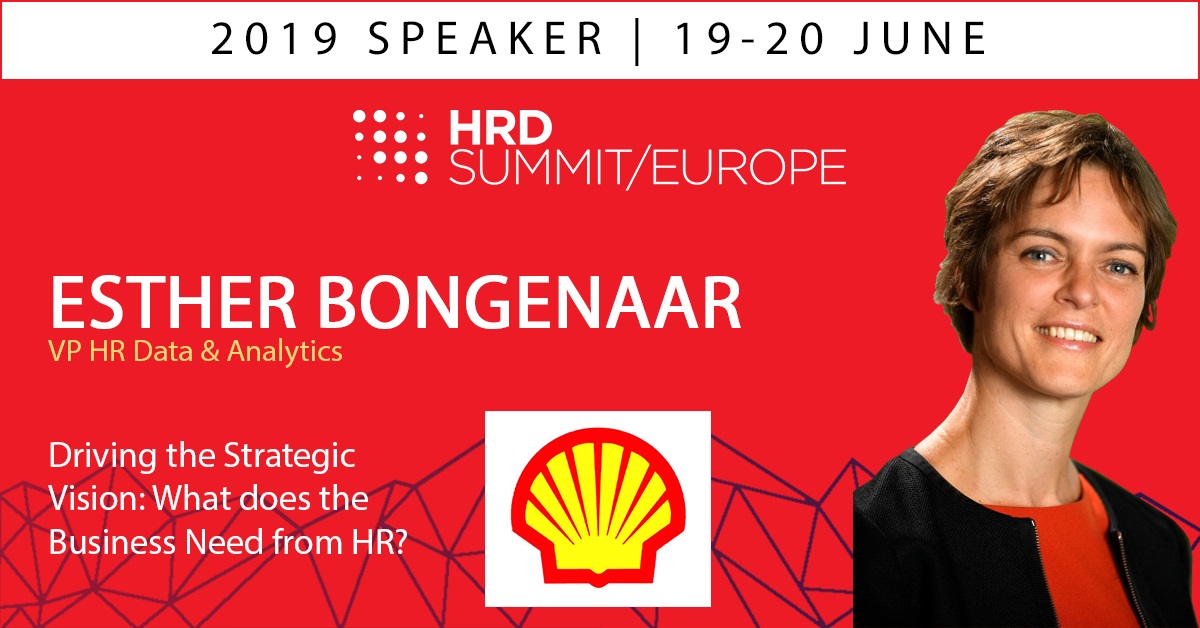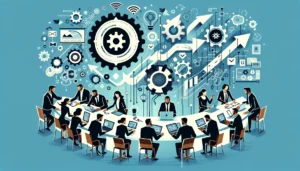Driving the strategic vision: Esther Bongenaar, VP HR Data & Analytics, Royal Dutch Shell
- 7 Min Read
Ahead of her appearance at the HRD Summit EU at the RAI Amsterdam, June 19th-20th 2019, Esther Bongenaar, VP HR Data & Analytics, Royal Dutch Shell, spoke to HRD Connect about how HR can become an effective strategic partner to business.
- Author: Michael Hocking
- Date published: May 9, 2019
- Categories

Do you achieve the impact that you’d like to achieve within your organisation?
The HR function is essential to the growth of business. In the near future, with our work styles, demands and methods of communication changing rapidly, the centrality of HR to this growth will only intensify.
With all of this and a bottom line firmly in mind, how can HR become a truly strategic partner to business?
Ahead of her appearance at the HRD Summit EU at the RAI Amsterdam, June 19th-20th 2019, Esther Bongenaar, VP HR Data & Analytics, Royal Dutch Shell, spoke to HRD Connect about how HR can become an effective strategic partner to business, the data-driven backbone of an ‘intelligent organisation’, and whether or not the potential of HR has been misunderstood.
Are HR professionals failing to achieve the impact they perceive themselves to be achieving?
I don’t think they are failing. I think the key is that HR shouldn’t operate in isolation. We do our most successful work when we manage to work cross-functionally, or, within HR, when we manage to break the silos between different kinds of HR work streams.
So, it’s about creating a shared ownership? You can only have impact, on an individual or a business, if you share the same purpose. I think if you fail to have impact, then you’re probably not aligned on what you’re working towards, so you need to ensure you have a common set of goals. It starts with what you measure? What do you put on the dashboard? What gets measured, gets done. If you’re aligned, and if you’re driving the same thing, you will have impact.
What makes a truly strategic HR partner?
A true HR partner is similar to a partner from any other function, an IT partner, a finance partner, with their unique element being that the HR partner is focusing on employees.
But all business partners need to understand the business and what drives performance. So for an HR professional, that means knowing how an employee impacts business performance. If you understand the relationship between employees and the business, then you can also initiate and drive change. That may be different from what you cooked up in your own silo. It might have seemed that it was a good idea to do for instance reward management in one way. But that idea could be challenged, and you would recommend to change it to something that deviates from your functional line. It should all be in the interest of the business, and a good strategic partner is a partner that works in the interest of the business.
How can an HR partner effectively action this?
It’s important to understand the needs of your business, your staff, and to be flexible. What are the drivers of business performance? For example, What is the difference between a really good salesperson and an average salesperson? Do you really understand what the mechanisms are that drive sales? Or which training has a positive impact on sales performance?
You might think you have an effective reward strategy for your company, but analysis may show different impact per business line; the effect of your reward strategy in a sales environment might be different from other areas of your business. Then you need to have a discussion within HR and with business. Are we going to deviate? Does it make sense? Is it the case big enough? For us, because it’s about people, there’s hardly ever a straight line from an insight to action. There is a lot of people who have a say in the process. That could be for reasons of data privacy, or it could have more to do with the philosophy of how we want to care for our people.
What is an intelligent organization and how is it fostered?
My team provides data, reporting, assessments and analytics to the HR organization, and what we drive is evidence-based HR. However, that doesn’t mean that an algorithm is going to make all the decisions in the future. So for us, an intelligent organization – or, I would say, an evidence-based organization – is an organization that has the right balance between evidence and intuition, beliefs and experience. There’s a lot we know about people, but there’s also a lot that we don’t fully understand.
You can also choose to collect data, or choose not to collect it. You can give every employee a Fitbit, or you can choose not to because it is intrusive. With the limited perspective you generate from data, in combination with all the experience the HR function holds, which may or may not be accurate, you need to arrive at the best decision at that moment in time, but also rigorously re-evaluate. For me, it’s about finding the right balance between experience, beliefs, intuition, and the evidence that you can create. Because it’s about people.
Do you think the potential of the HR leader is misunderstood by many organizations?
Possibly. But I struggle a little bit with HR being formulated as a victim. First you have to perform, and then your potential is recognized. Often if HR feels misunderstood, they need to partner better, or to better understand what the business needs, in order to be understood. if you’re focusing your efforts on something that is not appreciated, then you’re probably not working in the right direction.
I believe that if you really understand what drives the business , then you can derive a common goal, a common purpose. In this case, I don’t think anyone misunderstands your potential, because you’re representing the human capital of the company. I genuinely believe that in many businesses, people have a big impact on business performance. If you want to get more out of your people, in a good sense, so as not to squeeze them, and you want everyone to thrive in their roles to drive business value, then everyone in your organisation would appreciate that. So, if you feel misunderstood as an HR professional, you might not be working with the same goals as your business partner.
How do you think the HR leader’s role within business will change in the next 10 years?
I think the relationship between employees and business will become more tangible. The understanding of how people impact business performance is something that, for most of the high skilled labor force, is still very subjective. Do you really understand what the bottom line impacts of a lawyer in your company is or the HR professional? Often businesses don’t have a good understanding of how these individuals bring business value, and how they bring positive impact. I think improved understanding will change the debate around the HR leader’s role, and bring it to the next level – how do they positively impact our organisation?
We need a bit more evidence to make this a reality. But there’s also a few risks. You need to protect the privacy of employees, you need to make sure you don’t lose the trust, and you need to be very transparent in what you do with all these gained insights. There’s a lot more tolerance around profiling customers in a retail type of setting, than there is around profiling employees. People don’t like algorithms or data that make decisions with impact on their career, and there are numerous examples that companies have decided to go with algorithms, but have pulled back because people are not comfortable going in that direction. It’s a delicate balance, and your people have to come first.








